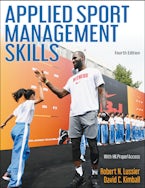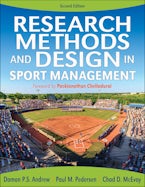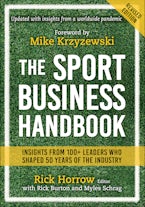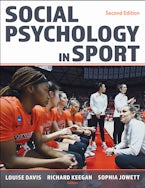- Home
- Sports and Activities
- Sport Management and Sport Business
- Contemporary Sport Management

Keeping pace with the rapidly evolving field of sport management, Contemporary Sport Management, the authoritative introductory text in the field, returns with a thoroughly updated seventh edition. Over 50 contributors with a diverse array of cultural and educational backgrounds deliver a complete and contemporary overview of the field, presented in full color for a visually engaging read.
With a simplified structure to reflect current demands of the profession and addressing all the Common Professional Component topics outlined by the Commission on Sport Management Accreditation (COSMA), Contemporary Sport Management, Seventh Edition With HKPropel Access, is organized into three parts. Part I, Introduction to Sport Management, provides an overview of the field and leadership concepts associated with it. Part II, Sport Management Sites, details the major settings in which many sport management careers are carried out, including new content on sport participation across the life span. In part III, Sport Management Functions, readers will learn about the key functional areas of sport management, including sport marketing, sport communication, sport facility and event management, and more, with new content on sales as a career path.
New and updated content throughout this edition allows students to stay on the leading edge of the field:
- Discussion of the evolution of esports, fantasy sports, and sport betting
- Content covering emerging technologies in sport management, including streaming, artificial intelligence (AI), augmented reality (AR), and virtual reality (VR)
- New case study sidebars with short-answer questions
- Recommended Case Studies in Sport Management journal articles for each chapter, designed to promote critical thinking and demonstrate understanding of chapter content
Contemporary Sport Management, Seventh Edition, will broaden students’ understanding of sport management issues, emphasizing critical thinking, ethics, and diversity while providing students with an introduction to all the aspects of the field they need to know as they prepare to enter the profession.
Note: A code for accessing HKPropel is included with all new print books.
Chapter 1. Managing Sport
Paul M. Pedersen and Lucie Thibault
Defining Sport and Sport Management
Nature and Scope of the Sport Industry
Unique Aspects of Sport Management
Sport Management Competencies
Future Challenges and Opportunities
Learning Aids
Chapter 2. Developing a Professional Perspective
Sally R. Ross, Brian P. McCullough, and Antonio S. Williams
Professional Preparation
Professional Attitude
Career Planning and Management
Career Readiness for Occupational Success
Learning Aids
Chapter 3. Management Concepts and Practice in Sport Organizations
Kathy Babiak, Kathryn Heinze, and Lucie Thibault
Organization Defined
Types of Sport Organizations
Organizational Environment
Organizational Effectiveness
Organizational Strategy
Organizational Culture
Organizational Structure and Design
Organizational Change and Innovation
Critical Thinking in Sport Organizations
Ethics in Sport Organizations
Learning Aids
Chapter 4. Managing and Leading in Sport Organizations
Shannon Kerwin, Ming Li, and Laura J. Burton
Theoretical Approaches to Management
Management Functions
Classifications of Managers
Managerial Skills
Leadership
Decision Making, Authority, and Power
Organizational Diversity
Critical Thinking in Sport Managing and Leading
Ethics in the Leadership of Sport Organizations
Learning Aids
Chapter 5. Sociological Aspects of Sport Management
Nicole M. LaVoi, Nancy L. Lough, and Dunja Antunovic
Social Significance of Sport
Benefits of Sport
Dark Side of Sport
Sport as a Vehicle for Social Transformation
Implications for Sport Managers
Critical Thinking in Sport Sociology
Ethics in Sport Sociology
Learning Aids
Chapter 6. Sport Management Research
Nola Agha, Jess C. Dixon, and Brendan Dwyer
What Is Sport Management Research?
Why Sport Managers Need to Understand Research
Key Features of Quality Research
Ethics in Sport Management Research
Critical Thinking in Sport Management Research
Current Challenges in Sport Management Research
Future of Sport Management Research
Learning Aids
Part II. Sport Management Sites
Chapter 7. Managing Sport Participation Across the Lifespan
Marlene A. Dixon, Jennifer E. McGarry, and Justin Evanovich
Origins of Community Sport
Youth Sport History
Definition of Community Sport
Size and Scope of Community Sport
Types of Community Sport Organizations
Management Challenges
Adult Community Sport Offerings
Youth Sport Offerings
Critical Thinking in Community and Youth Sport
Ethics in Community and Youth Sport
Learning Aids
Chapter 8. Interscholastic Athletics
Eric W. Forsyth, Tywan G. Martin, and Warren A. Whisenant
Arrival of Interscholastic Athletics
Governance of Interscholastic Athletics
Value of Interscholastic Athletic Programs
Participation Numbers
Operating Models
Careers in Interscholastic Athletics
Issues Facing Interscholastic Athletics
Critical Thinking in Interscholastic Athletics
Ethics in Interscholastic Athletics
Learning Aids
Chapter 9. Intercollegiate Athletics
Ellen J. Staurowsky, Robertha Abney, and Nicholas M. Watanabe
Origins of Intercollegiate Athletic Governance
College Sport Finance
Intercollegiate Athletic Administrators
Critical Thinking in Intercollegiate Athletics
Ethics in Intercollegiate Athletics
Learning Aids
Chapter 10. Professional Sport
Jacqueline McDowell, Amy Chan Hyung Kim, and Natasha T. Brison
Historical Aspects of Professional Sport
Unique Aspects of Professional Sport
Revenue Sources for Professional Sport Teams
Future Challenges Facing Professional Sport
Career Opportunities in Professional Sport
Critical Thinking in Professional Sport
Ethics in Professional Sport
Learning Aids
Chapter 11. Sport Management and Marketing Agencies
Danielle Smith, Catherine Lahey, and Cindy Lee
Functions of Sport Management and Marketing Agencies
Types of Sport Management and Marketing Agencies
Careers in Agencies
Challenges Facing Agencies
Critical Thinking in Agency Activities
Ethical Issues in Sport Management and Marketing Agencies
Learning Aids
Chapter 12. International Sport Management
Ceyda Mumcu, Elsa Kristiansen, and Ashleigh-Jane Thompson
What Is International Sport?
Expansion of International Sport
Current Issues in International Sport
Guidelines for Future International Sport Management Leaders
Critical Thinking in International Sport
Ethics in International Sport
Learning Aids
Chapter 13. Emerging Developments in Sport Management
Gashaw Abeza, BerNadette Lawson-Williams, and Elizabeth Wanless
Part III. Sport Management Functions
Chapter 14. Sport Marketing
Ketra L. Armstrong, Brian Turner, and Kim Miloch
Developing a Sport Marketing Plan
Market Research
Critical Thinking in Sport Marketing
Ethics in Sport Marketing
Future of Sport Marketing
Learning Aids
Chapter 15. Sport Sales and Consumer Behavior
Andrea N. Geurin, Cara Holdsclaw, and James J. Zhang
Understanding the Individual as a Sport Consumer
Group Influences on the Sport Consumer
Situational Influences on the Sport Consumer
Consumer Decision Making in Sport
Sport Consumer Behavior Challenges and Issues
Critical Thinking in Sport Consumer Behavior
Ethics in Promoting Sport Consumer Behavior
Learning Aids
Chapter 16. Analytics in the Sport Industry
Kevin Mongeon, David P. Hedlund, and Ryan Spalding
The Sport Analytics Process
Sport Analytics Techniques
Critical Thinking in Sport Analytics
Ethics in Sport Analytics
Sport Analytics in Practice
Learning Aids
Chapter 17. Communication in the Sport Industry
G. Clayton Stoldt, Stephen W. Dittmore, and Paul M. Pedersen
Theoretical Framework of Sport Communication
Strategic Sport Communication Model
Media Relations in Sport
Community Relations in Sport
Critical Thinking in Sport Communication
Ethics in Sport Communication
Learning Aids
Chapter 18. Finance and Economics in the Sport Industry
Timothy D. DeSchriver, Sarah Williams, and Daniel F. Mahony
Current Financial Situation of U.S. Professional Sport
Current Financial Situation of U.S. College Athletics
Economics of Sport
Overview of Financial Management
Sources of Revenue and Expenses for Sport Organizations
Careers in Financial Management for Sport Organizations
Critical Thinking in Sport Finance and Economics
Ethics in Sport Finance and Economics
Learning Aids
Chapter 19. Sport Facility and Event Management
Brianna L. Newland, Stacey A. Hall, and Thomas J. Aicher
Overview of Facility Management
Facility Management
Event Management
Critical Thinking in Sport Facility and Event Management
Ethics in Sport Facility and Event Management
Learning Aids
Chapter 20. Legal Considerations in Sport Management
Lauren McCoy, Amanda M. Siegrist, and R. Christopher Reynolds
Basics of Law
U.S. Constitution
Federal Legislation
State Legal Systems
Future Challenges
Critical Thinking in Sport Law
Ethics in Sport Law
Learning Aids
Paul M. Pedersen, PhD, is a professor of sport management within the department of kinesiology in the School of Public Health at Indiana University at Bloomington (IU). He has worked as a sports writer, sport management consultant, and sports business columnist. Pedersen’s primary areas of scholarly interest and research are the symbiotic relationship between sport and communication and the activities and practices of various sport organization personnel.
A research fellow of the North American Society for Sport Management (NASSM), Pedersen has published 10 books (including Sport and the Pandemic, Strategic Sport Communication, Handbook of Sport Communication, and Research Methods and Design in Sport Management) and over 110 articles in peer-reviewed outlets such as the Journal of Sport Management, European Sport Management Quarterly, Sport Marketing Quarterly, International Journal of Sports Marketing and Sponsorship, Sociology of Sport Journal, International Review for the Sociology of Sport, and Journal of Sports Economics. He has also been a part of more than 125 refereed presentations at professional conferences and more than 50 invited presentations, including invited addresses in China, Denmark, Hungary, Norway, and South Korea. He has been interviewed and quoted in publications as diverse as the New York Times and China Daily.
Founder and editor in chief of the International Journal of Sport Communication, he serves on the editorial board of seven other journals. A 2020 distinguished alumni award (Florida State University, College of Education) recipient and 2011 Golden Eagle Hall of Fame (East High School in Pueblo, Colorado) inductee, Pedersen lives in Bloomington, Indiana, with his wife, Jennifer, and their two youngest children, Brock and Carlie. Their oldest children and their spouses (Hallie, Liam, Zack, and Megan) live in Bloomington and Chicago.
Lucie Thibault, PhD, is a professor in sport management and dean of the faculty of health sciences at the University of Ottawa in Ontario, Canada. She has previously taught sport management at Brock University as well as at the University of British Columbia and the University of Ottawa.
In her 30 years of teaching, Thibault has taught courses in organizational theory, organizational behavior, ethics in sport, globalization of sport, and policy and social issues in sport. Thibault has served on the editorial board of the International Journal of Sport Policy and Politics, the European Sport Management Quarterly, and the Journal of Sport Management. She was also the editor of the Journal of Sport Management. She is a member of the North American Society for Sport Management (NASSM) and was named a research fellow of NASSM in 2001. In 2008, Thibault was awarded the Earle F. Zeigler Lecture Award from NASSM for her scholarly and leadership contributions to the field.
Thibault’s research interests lie in the formation, management, and evaluation of cross-sectoral partnerships in sport organizations. She also investigates the role of the Canadian government in sport excellence and sport participation as well as government involvement in developing sport policy. She has been an invited speaker at many conferences around the world. Her research has appeared in numerous scholarly journals, including the Journal of Sport Management, International Review for the Sociology of Sport, Journal of Sport and Social Issues, Human Relations, Leisure Studies, European Sport Management Quarterly, International Journal for Sport Policy and Politics, and Nonprofit and Voluntary Sector Quarterly. Thibault resides in Ottawa.










